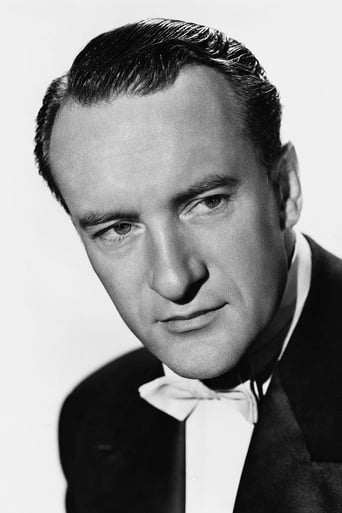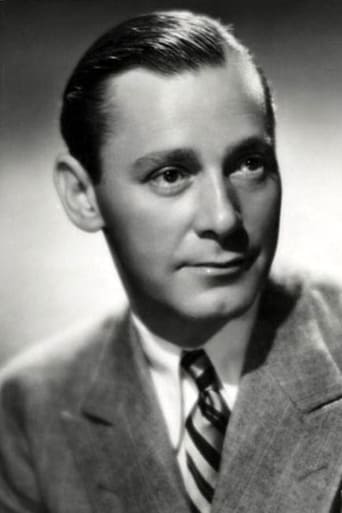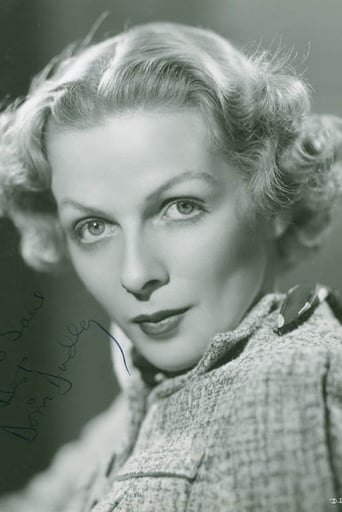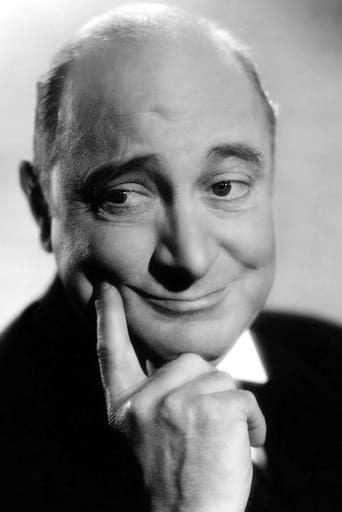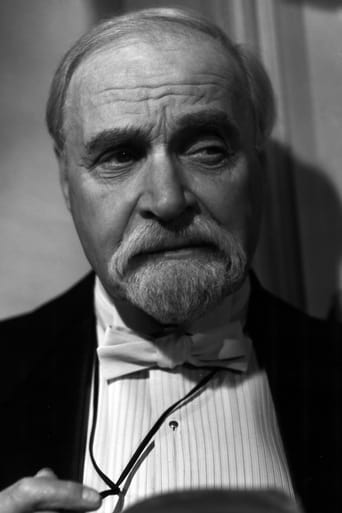Beystiman
It's fun, it's light, [but] it has a hard time when its tries to get heavy.
Fairaher
The film makes a home in your brain and the only cure is to see it again.
Humaira Grant
It’s not bad or unwatchable but despite the amplitude of the spectacle, the end result is underwhelming.
Donald Seymour
This is one of the best movies I’ve seen in a very long time. You have to go and see this on the big screen.
johndunbar-580-920543
The most extraordinary feature of this film is the incredible smoothness it adds to the story line; it's a masterpiece of great dialogue and incredible actors to deliver the story. Who has ever seen any better, and unobtrusive, acting than that of the likes of Saunders, Marshall and the relatively unknown but great actor Steven Gary (who plays Dirk Strouve) ? One will never see another film to exceed this one in these respects.
bkoganbing
Herbert Marshall plays W. Somerset Maugham in fact if not name in The Moon And Sixpence as he narrates the story of how his life intersected with that of George Sanders a man who left middle class respectability to do his thing with painting, first in Paris and then the South Seas. Marshall is his erudite best and Sanders once again is a cad.When Marshall first knows Sanders he's the soul of Victorian rectitude, no one suspecting what is beneath the surface. So when one fine day he up and leaves his wife Molly Lamont to go live the Bohemian life as a painter in Paris it shocks everybody. In fact Lamont prevails on Marshall to go to Paris to see what brought this about.Somerget Maugham's view on human relations and the creative soul are once again given an airing in The Moon And Sixpence. Maugham was a gay man, but there are certain gay men who truly do not like women on most levels. They make too many demands on the creative man, fascinated though they might be by him. That view is in full force when dealing with Lamont and with Doris Dudley who plays a married woman who leaves her husband Steven Geray to take up with Sanders in Paris. His ideal woman is Tahitian Elena Verdugo, pretty and sexy without too much education who takes care of man's physical needs with no demands. Women were not Maugham's favorites. You can see that in work like Of Human Bondage with Mildred Rogers or in Rain with Sadie Thompson. And I can't forget The Razor's Edge and the part that Gene Tierney plays.Sanders is a caddish as he ever has gotten on the big screen for the first two thirds of the film. But in Tahiti with no demands on him he becomes a mensch. For myself staying a mensch when life does make demands on you is the true test. But what do I know? The Moon And Sixpence is Maugham at his misanthropic best. Sanders and Marshall top a fine cast in a film that could have been a real classic with a bigger budget from an A list studio. Herbert Marshall would be the narrator author W. Somerset Maugham again in The Razor's Edge which is a better film. This one in fact did get an Oscar nomination for Dimitri Tiomkin's musical scoring. The Moon And Sixpence can definitely hold its own.
Martha Wilcox
As a George Sanders fan I was disappointed to see him in this poorly written, directed and acted film. Not only is he insensitive, he is unsympathetic. In 'Samson and Delilah' he plays an antagonist. Because the script is good and the direction is at DeMille's best, Sanders' performance is sympathetic, and you like both the protagonist and the antagonist. In 'Ivanhoe' he plays the antagonist, Bois Guilbert. He is likable and sympathetic because the writing is good, and Richard Thorpe's directing is at his best. Therefore Sanders' performance is sympathetic. This is a successful anti-hero, but his performance in this film is anti- sympathetic. He is totally unlikeable, and there are no redeeming qualities in the film whatsoever. I'll have to read the novel to see if it is as disappointing as the film.
d_anast
A creator of such intellect as Albert Lewin, the director/adapter of The Moon & Sixpence, rarely had the opportunity in classic period Hollywood to showcase such a unique talent as he had and we are fortunate to have had him. There were only a handful like him that beat the odds and actually were allowed to produce true art instead of common trash -- Sternberg, Ulmer, Sturges come to mind -- and in many ways Lewin stood apart because he worked the system without challenging the former tailors and junk dealers that ran Hollywood. He made a quartet of films that express his unique style magnificently. These are, in order: The Moon & Sixpence, The Picture of Dorian Gray, The Private Affairs of Bel Ami and Pandora And The Flying Dutchman. The common threads are stateliness, pacing and intelligence, with literate dialogue that has a sophistication that belies the commercialism of the time. His lead of choice was George Sanders, who was perfectly cast in the first three titles as a symbol of an age. The Moon and Sixpence is the first of this quartet and showcases what a small budget but superior talent can create. Each film was an improvement on its predecessor, and I recommend that those out there interested in stylized film follow Lewin's work chronologically to observe the course of aesthetic refinement, beginning with The Moon & Sixpence.
